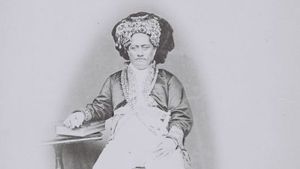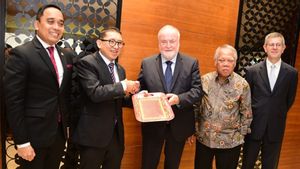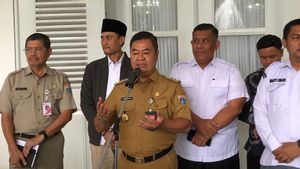The discourse of legalizing online gambling practices has emerged to the public. Content, this has received various negative responses from various parties. It is feared that the younger generation of Indonesia will be busy playing gambling if the government sets taxes on the prohibited game.
The discourse of taxing online gambling was issued from the Ministry of Communication and Information during a meeting with Commission I of the DPR RI. In the meeting, it was stated that Indonesia's potential loss due to online gambling was large enough to require the government to impose taxes.
Deputy Chairman of Commission I of the DPR Abdul Kharis Almasyhari emphasized that taxes for online gambling are still in discourse and the majority of all members in Commission one of the DPR reject this.
"No, it's just a discourse and those who propose also disagree because this country has regulations regarding the prohibition of gambling and the majority in commission one also disagree if online gambling games are taxed, period," said the politician from PKS to VOI, Monday, October 9.
Abdul said the statement from the Minister of Communication and Information, Budi Arie was only a parable that only in this country prohibits gambling operations. Meanwhile, other ASEAN countries such as Cambodia legalize gambling and even collect taxes from gambling.
"All the majority agreed to be banned, period. So what is developing is how to prohibit this, online gambling is closed by a thousand, growing by ten thousand. To be effective in how to close it," he said.
Minister of Communication and Information Budi Ari Setiadi emphasized that the government will not apply taxes for online gambling. He added that currently the government will still eradicate all gambling practices in the country.
"No, it's still (the discourse), just wait, the important thing is that our task is to eradicate online gambling," said Budi Ari after a working meeting with Commission I of the DPR RI, (4/9).
He also emphasized that until now gambling is an illegal act in Indonesia. Budi emphasized this because if the tax discourse is realized, it means also legalizing online gambling.
"Until now gambling is an illegal act in Indonesia. So, everyone who does gambling or acts of gambling must face the law," he said.
The law that prohibits online gambling is contained in article 27 of the ITE Juncto Law article 45 paragraph 2 Number 19 of 2016. It is stated that the article contains a prohibition on acts containing gambling. The punishment for those who violate is that they are sentenced to a maximum imprisonment of 6 years and/or a maximum fine of Rp1,000,000,000.00 (one billion rupiah). In the criminal law book, gambling is regulated in article 303.
VOIR éGALEMENT:
Chairman of the Muhammadiyah Central Executive Haedar Nashir, also spoke out on the proposal for tax levies from online gambling. According to him, the discourse actually raises the impression that the government is ambiguous. On the one hand, it gives leeway to things that damage the morality of the younger generation and on the other hand want to legalize by imposing taxes.
He asked the government to seriously study the rise of online gambling. The government is also expected to make policies that are productive, conducive, constructive, and positive for the younger generation as the nation's future.
Tax observer from the Center for Indonesia Taxation Analysis (CITA) Fajry Akbar said that levies for online gambling taxes could be carried out through value added tax and trade through electronic systems (PPN PMSE). The problem is that if this is used it will go against the rules in other laws on gambling.
"It is also impossible for us to impose excise duty but in other laws such as in the Criminal Code and the ITE Law prohibiting gambling activities," explained Fajry in a written statement.
Income from Gambling includes PPh
Regardless of winning or losing when playing online slots, the income from online gambling can be categorized as income tax (PPh). This is regulated in Article 4 paragraph (1) of the PPH Law (UU Number 7/183 with the last amendment in accordance with Law Number 6/2023 concerning Job Creation.
So, income according to these provisions includes five elements. First, there is an additional economic ability. Second, the income has been received (cash basis) or obtained (accrual basis). Third, the source can be from within the country or outside Indonesia. Fourth, these incomes can be used for consumption or increase wealth. And fifth, its name and form can be anything.
Executive Director of the Pratama-Kreston Tax Research Institute (TRI) Prianto Budi Saptono explained that the current gambling game process can be included in the economic underground. The economic background is a legal and illegal production and sale of goods and services, but these activities are not recorded and registered in tax records, do not refer to labor regulations and are not included in the social security system.
Prianto said the income from gambling games was included in the tax object. He also added that when checking, the tax office does not care whether the income earned is halal or haram religiously or not based on positive laws in force in Indonesia.
"The tax office does not see whether the income comes from a source that is halal or haram religiously or legally positive in force in Indonesia," he said.
The Dangers Of Online Gambling And Online Loans
The discourse on online gambling tax is considered to legalize gambling practices in Indonesia. It is feared that legalizing gambling will lead to illegal gambling sites in the country. And tax collection for online gambling is not a proper solution.
Director of the Center of Economics and Law Studies (Celios) Bhima Yudhistira considered it very inappropriate for the government to have difficulty supervising and then taxing gambling practices which are now packaged in online slot games.
"Don't because of the difficulty of supervising and controlling online gambling and then being transferred to the taxation of the game. No one will dare to guarantee that if gambling is legalized through taxes does not cause new problems. There is online gambling that pays the existing tax while the illegal ones continue to thrive," he said.
According to him, the impact of online gambling will greatly disrupt productivity and can trigger various other criminal problems. He gave an example, the online gambling phenomenon is closely related to illegal online loans (pinjol).
This can be seen from google trends, it turns out that there is a similar trend of searching for Zeus Slot with online loans. In late 2021 to 2022, there was indeed an increase in keyword searches for Zeus Slot and online loans.
The same thing was conveyed by researcher from the Institute for Development of Economics and Finance (INDEF) Nailul Huda. He revealed an increase in the number of online loan transactions (pinjol) related to online gambling activities. He referred to data from the Financial Transaction Reports and Analysis Center (PPATK) regarding the increase in suspicious transactions related to gambling which reached 11.84 percent of the total 94 thousand reports in 2022 yesterday.
The transaction figure has experienced a significant increase compared to 2020 which was only 1.6 percent of the 68,000 reports. This means that from 2020-2022, reports related to gambling have increased by about 10 times.
This increase is in line with the nominal transaction of IDR 69.9 trillion, which came from 69.9 million transactions analyzed by PPATK in 2022 yesterday. Huda explained that the relationship between online gambling and loans is very close, especially if you look at the nominal transaction analyzed by PPATK.
"There is a very close relationship between online gambling and online loans. It is possible that there are people who play online gambling and then lose and borrow money from online loans to play again. So online gambling is very dangerous," he said.
The Public Relations Coordinator of the Financial Transaction Reports and Analysis Center (PPATK) Nasir Kongah when contacted said that until now PPATK has continued to monitor the flow of funds allegedly related to online gambling transactions. This is also a response to various reports from the public that go to PPATK or to the police. A number of the results of the analysis, both proactive and reactive, have been submitted to the Police for follow-up.
"Especially for the period August to September 2022 PPATK has submitted the results of an analysis related to gambling to the Police, with details of 21 Proactive Analysis Results and 16 Reactive Analysis Results based on police requests," said Nasir Kongah.
During that period, PPATK had also temporarily suspended transactions on 242 accounts because it was indicated to have something to do with gambling activities. Coordination continues to be carried out by PPATK with the Police to accelerate follow-up and disclose gambling activities in Indonesia.
"Responsively, PPATK coordination continues, and the investigation and investigation process continues to be carried out by the Police," he added.
Nasir said that since PPATK was established in 2002, PPATK has been very serious about dealing with gambling problems as part of a money laundering crime. And starting in 2017 transactions related to online gambling tended to increase.
"Since 2017 online gambling transactions have tended to increase every year with the total number of transactions analyzed by more than 155 trillion rupiah, and no less than 25 online gambling-related analysis results have been submitted to law enforcement officials by PPATK from 2019 to June 2022," concluded Nasir Kongah.
The English, Chinese, Japanese, Arabic, and French versions are automatically generated by the AI. So there may still be inaccuracies in translating, please always see Indonesian as our main language. (system supported by DigitalSiber.id)














